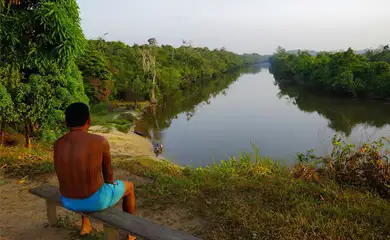Summer rainfall fails to replenish soil in Brazil

O déficit hídrico acontece justamente no período de semeadura, contribuindo para perdas de diversas culturas agrícolas.The volume of rainfall last summer, which ended Thursday (Mar. 20), was not enough to replenish the water stock in the soil, causing a shortage that is damaging to agricultural production, Brazil’s meteorology authority Inmet, linked to the Ministry of Agriculture, reported.

“The volumes were not enough to recover the water stock in the soil, battered as it was by the recent droughts and wildfires that have hit the Amazon, the cerrado, and the pantanal biomes more frequently over the last two years,” the institute said, adding that parts of Brazil—such as the states of Amazonas, southwest Pará, and areas of Maranhão and Piauí—had a fairly rainy season.
From December 2024 to February this year, the rainfall deficit compared to the average was 200mm in the northernmost part of the pantanal, northern Mato Grosso, Rondônia, eastern Acre, and southwestern Pará. This is equivalent to 200 liters of rainwater falling on each square meter of soil.
Bad for agriculture
The water shortage in the last quarter resulted in the loss of leaves in forested areas in western Pará, eastern Amazonas, Rondônia, and the Mato Grosso pantanal. In addition, the institute found a reduction in grain productivity due to low soil humidity.
The deficit is said to have occurred precisely during the sowing period, contributing to losses in various crops.
Inmet agro-meteorologist Lucietta Martorano noted that the effects of such rainfall patterns will vary across Brazil.
“Much of the western Amazon should have a supply of water in the soil, which may favor agricultural crops, but the pantanal and virtually all of central Brazil, plus the state of Minas Gerais and the western portions of São Paulo up to Rio Grande do Sul, have a limited supply of rain, leaving the soil drier and hindering water recovery.”
Agricultural production is one of the factors directly affecting the economy, as fewer products are available, resulting in higher food prices.
Food inflation is currently one of the government’s main concerns. Brazil’s consumer price index IPCA-15, which determines the country’s official inflation, stood at 0.64 percent in March. The data released Thursday (27) reveal that food put the most pressure on the indicator. Finance Minister Fernando Haddad, however, said early this month he believes food prices should fall by 2025, mainly due to the over-harvest forecast for the year.
Sweltering heat
Summer 2024–2025 was the sixth hottest in Brazil since 1961. The average temperature was 25.81ºC—0.34°C above the historical average for 1991–2020 (25.47°C). The record was set in summer 2023–2024, with an average 26.20°C.



Dê sua opinião sobre a qualidade do conteúdo que você acessou.
Escolha sua manifestação em apenas um clique.
Você será direcionado(a) para o sistema Fala.BR, mas é com a EBC que estará dialogando. O Fala.BR é uma plataforma de comunicação da sociedade com a administração pública, por meio das Ouvidorias.
Sua opinião ajuda a EBC a melhorar os serviços e conteúdos ofertados ao cidadão. Por isso, não se esqueça de incluir na sua mensagem o link do conteúdo alvo de sua manifestação.
Clique aqui para mais informações sobre a Ouvidoria da EBC.









